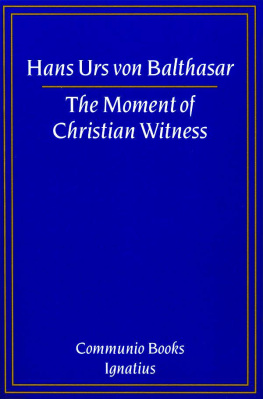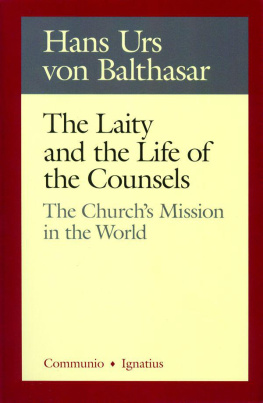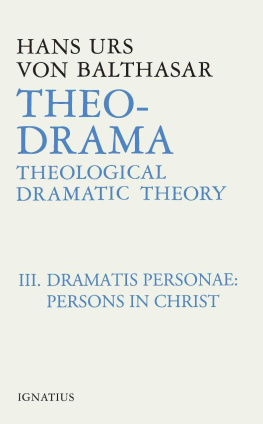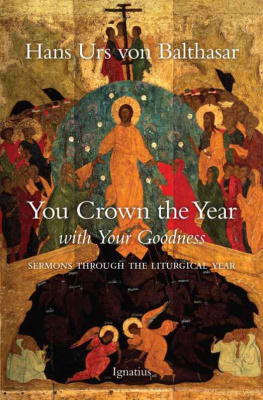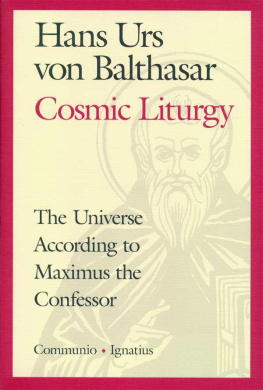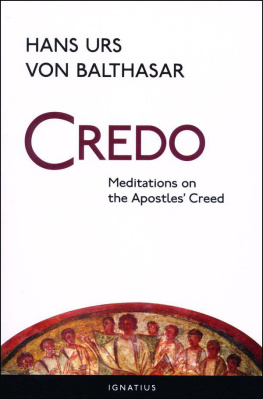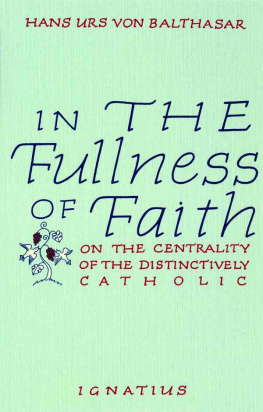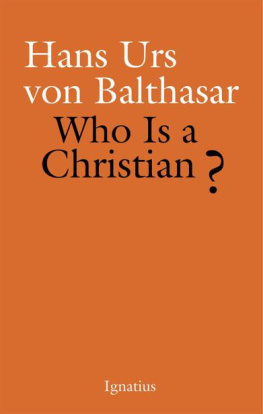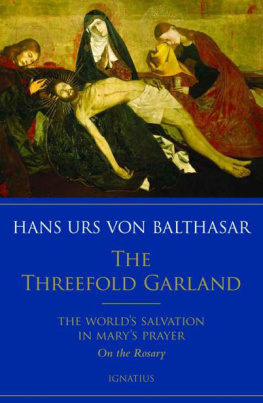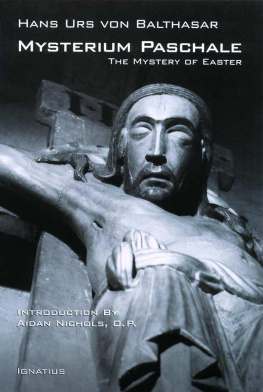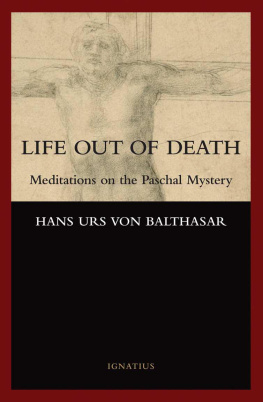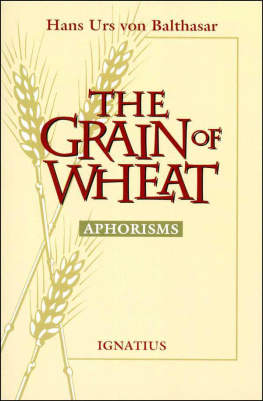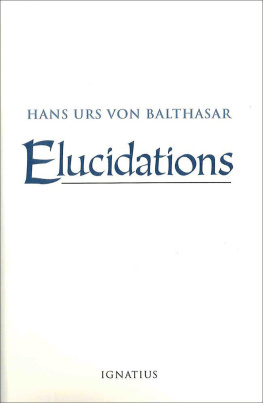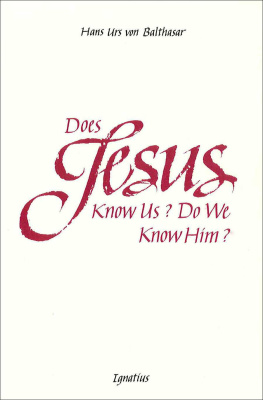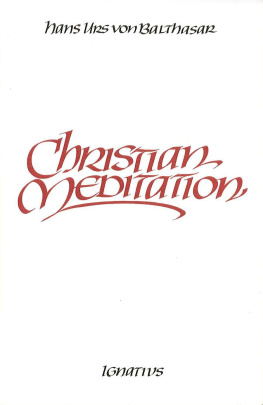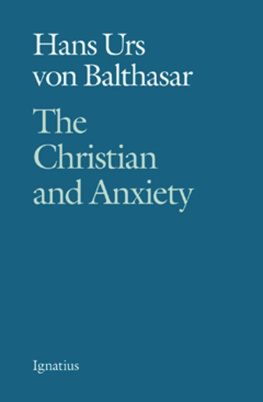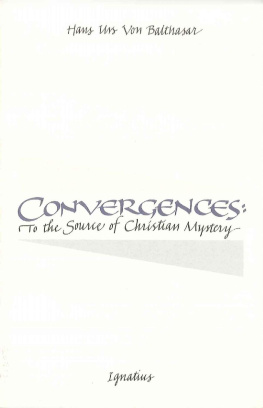Hans Urs von Balthasar - The Moment of Christian Witness
Here you can read online Hans Urs von Balthasar - The Moment of Christian Witness full text of the book (entire story) in english for free. Download pdf and epub, get meaning, cover and reviews about this ebook. year: 1994, publisher: Ignatius Press, genre: Religion. Description of the work, (preface) as well as reviews are available. Best literature library LitArk.com created for fans of good reading and offers a wide selection of genres:
Romance novel
Science fiction
Adventure
Detective
Science
History
Home and family
Prose
Art
Politics
Computer
Non-fiction
Religion
Business
Children
Humor
Choose a favorite category and find really read worthwhile books. Enjoy immersion in the world of imagination, feel the emotions of the characters or learn something new for yourself, make an fascinating discovery.
- Book:The Moment of Christian Witness
- Author:
- Publisher:Ignatius Press
- Genre:
- Year:1994
- Rating:3 / 5
- Favourites:Add to favourites
- Your mark:
- 60
- 1
- 2
- 3
- 4
- 5
The Moment of Christian Witness: summary, description and annotation
We offer to read an annotation, description, summary or preface (depends on what the author of the book "The Moment of Christian Witness" wrote himself). If you haven't found the necessary information about the book — write in the comments, we will try to find it.
Hans Urs von Balthasar: author's other books
Who wrote The Moment of Christian Witness? Find out the surname, the name of the author of the book and a list of all author's works by series.
The Moment of Christian Witness — read online for free the complete book (whole text) full work
Below is the text of the book, divided by pages. System saving the place of the last page read, allows you to conveniently read the book "The Moment of Christian Witness" online for free, without having to search again every time where you left off. Put a bookmark, and you can go to the page where you finished reading at any time.
Font size:
Interval:
Bookmark:
THE MOMENT OF
CHRISTIAN WITNESS
Christian Witness
Translated by
Richard Beckley
IGNATIUS PRESS SAN FRANCISCO
Title of the German original:
Cordula oder der Ernstfall
1966, 1987 Johannes Verlag, Einsiedeln, Trier
Published with ecclesiastical permission
Translation 1969 by The Missionary Society of
St. Paul the Apostle in the State of New York
Cover design by Roxanne Mei Lum
Published in 1994 by Ignatius Press, San Francisco
ISBN 978-0-89870-516-4
Library of Congress catalogue number 94-75997
Printed in the United States of America
I
II
III
IV
In the following pages I make a proposal and submit it to Christians for their consideration. A criterion is offered, and indeed a better one. Better than what? This use of the unrelated comparative is well known in the advertising world. Brand X washes whiterwhiter than what? To say more might lead to legal complications with other soap manufacturers. It would, moreover, be a tactical mistake in the art of salesmanship, because the unrelated comparative is more stimulating and evocative in its effect than the related comparative. And on this occasion something a little more evocative is what is required.
A criterion has a stimulating effect, even if one uses it only in a purely experimental way to exercise ones imagination. If you say to Georges Bernanos, Come along with me. Its the Ernstfall the crucial moment in Christian experience, the old grumbler will get up out of his armchair without so much as raising an eyebrow and follow you like a lamb. But if you go to Reinhold Schneider, the author of Winter in Vienna , and say the same thing to him, there is no telling what might happen. Whether you would finally manage to get any response at all from those who have been demythologized and converted to the world, I do not know. They have already explained everything away and are left with a merely symbolic belief in a message that they understand only by analogy. For them, both the belief and the message are worth dying for only by analogy, just as they consider their Christianity worth living for only by analogy to something else.
However, let us take this lantern of Diogenes and see what can be done with its help. Perhaps by its light we shall distinguish between people who otherwise look very much alike from the outside. One of these may be burning with love, and in his eyes every means may seem right that will help him to speak in a new way of love of Christ to someone who is hard to convince in this respect. But another may secretly feel that he has heard enough about the gospel, the Cross and the whole business about dogma and the sacraments, because he senses something new in the air. He may be out to kill two birds with one stone; in an unexpected and unforeseen manner he may find he can get rid of several things that have been thoroughly ruined for him, and at the same time be able to march forward as an enlightened and reformed Christian, in line with the latest learning, toward a better future. One person will de-mythologize in order to arrive at a purer and deeper faith; another will do it in order not to have to believe anything at all any longer.
The present state of Christianity conceals as much ambiguity as ever it did in the past! Therefore, let us take the lantern and perhaps we shall find among the great number of those who profess to be Christians a few who genuinely are! For who knows if, when the show actually begins, there may not be quite a few who will gladly step up onto the stage and take the part of a Genesius or a Cordula?
Vatican II, Lumen Gentium
Dogmatic Constitution on the Church
1. The Scriptural Basis
Why was it that Jesus Christ prophesied no other fate for his disciples and followers than his own: persecution, failure and suffering to the point of death? It is true that the great speech with which he sends them out into the world at the end of St. Matthews Gospel, and which is splendidly phrased in words inspired by the Holy Spirit, entrusts them with a commission of universal significance for ail times and places and for all civilizations, both present and future, A commission, however, does not of itself constitute a guarantee that it will be carried through to its completion. It often happens that the greatest achievements of humanity are those that fill us with a vision of immense possibilities but break off before these possibilities are realized. It is true, moreover, that a commission of this kind makes such a superhuman demand on our strength that the prospect of our having to undergo suffering, or even to fulfill it partially, is never very far away. This is especially true when one considers that Christians are said to be sent out among wolvesa frightful image, if one takes the trouble to think for a moment what it really signifies: not only the helplessness and defenselessness of the lamb, but also the natural and therefore insatiable and ineradicable bloodthirstiness of the wolf. The great messianic speech in Matthew 10, which contains detailed instructions for putting into practical effect the inspired vision of Matthew 28:19-20, takes advantage of the sheep-wolf imagery as an occasion for a parallel series of statements interwoven one with another. One series is preceded by the warning Beware! and contains the darkest prophecies of coming persecutions in Matthew 10, verses 17-18, 21-22 and 34-36. The other series belongs together with the exhortation So have no fear of them! and contains the most joyful promises of victory in verses 19-20, 26, 28, 31 and 40-42.
The one series seems to be a clear contradiction of the other. For the situation of death is each time either implicit or explicit in the warnings. It is already implicit in the sheep-wolf imagery. If we do not feel it is expressed unambiguously enough in the incidents in which Christ is delivered up to the judgment of ecclesiastical courts and to scourgings, or is led before governors and kings, John makes it clear for us when he writes: Whoever kills you will think he is offering service to God (Jn 16:2), while in Matthew 10:12 paradosis is clearly described as being delivered up to death: Brother will deliver up brother to death, and the father his child, and children will rise against parents and have them put to death. Here the concern is with the death of the body as opposed to the death of the soul, since God alone has the power to consign us to damnation. The sword that divides men (Mt 10:34ff.) does not diminish the danger of death; on the contrary, it reveals the conditions preexistent within the situation, the likelihood of their extent: hate (Mt 10:22; Jn 15:18) and the unendurable pain of acknowledging Christ ( martyrion : Mt 10:18, cf. 32-33). But whereas the series of warnings clearly speaks of the situation of death, the series of promises seems to exclude each of them: But he who endures to the end will be saved (Mt 10:22), Even the sparrows are in the care of the Father; how much more so, therefore, are those who acknowledge his Son (Mt 10:29-31).
Next pageFont size:
Interval:
Bookmark:
Similar books «The Moment of Christian Witness»
Look at similar books to The Moment of Christian Witness. We have selected literature similar in name and meaning in the hope of providing readers with more options to find new, interesting, not yet read works.
Discussion, reviews of the book The Moment of Christian Witness and just readers' own opinions. Leave your comments, write what you think about the work, its meaning or the main characters. Specify what exactly you liked and what you didn't like, and why you think so.

